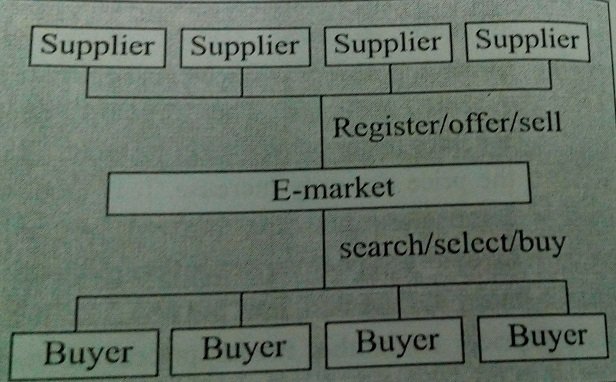e-Market:- Basically, an electronic market is a website where companies can buy from and sell to each other using a common technology platform. They are the commerce sites on the internet that allow a large number of buyers and suppliers to meet and trade with each other. They are also known as electronic marketplaces, online markets, e-hubs, or business-to-business markets.
Electronic Market(e-Market)
An electronic market is an inter-organizational information system they allow the participating buyers and sellers to exchange information about prices and product offerings. The firm operating the system is referred to as the intermediary, which may be a market participant- a buyer or seller, an independent third party, or a multi-firm consortium.
Electronic markets are the foundation or of electronic commerce. They potentially integrate advertising, product ordering, delivery of products, and payment systems. Many electronic markets also offer additional services, such as payment or logistics services that help members complete a transaction. They may also support community activities like distributing industry news, sponsoring online discussions, and providing research on customer demand or industry forecasts for components and raw materials.
Functions of E-Markets:-
E-markets serve three particular functions:
- They act as an exchange for business transactions-not only purchasing but also for checking price and stock availability, invoicing and order chasing.
- They manage catalog content, converting product information into a common format understood by all parties.
- They provide additional services to support the trading process such as shipping, payment, tendering and determining a company’s financial status.
Other functions performed by the e-markets:-
-
- E-markets provide an electronic or online method to facilitate transactions between buyers and sellers. They present ideal structures for commercial exchange, because of market efficiency attained by tightening and automating the relations between sellers and buyers of products and services.
- Electronic markets bring together their member companies into trading communities united by common business interest, thus improving speed and efficiency. They offer both buyers and sellers forums to reduce transaction costs, to enhance sales, to streamline distribution processes, to deliver and consume value-added services, and to streamline customer management.
- Electronic markets minimize the inefficiency by tightening the relationships between supplier and buyer, promoting price transparency, reducing supply chain costs, and increasing the reach of suppliers.
- By bringing buyers and sellers together online, electronic markets play the role of digital intermediaries. For example, demand and supply information can be aggregated and disseminated, and buyers and sellers can be matched in electronic markets.
- E-markets also provide the possibility of forwarding and reverse auctions. The forward auction brings together many buyers and on a seller. By this model, the price can only increase. It is most beneficial for companies that are looking to unload surplus inventory. The reverse auction model brings together many sellers and few buyers. The buyer drives the price, so in this model, prices are driven downwards.
- E-markets provide an efficient and cost-effective means of conducting trade. They automate and streamline multiple steps in the buying process and thus have evolved as new channels for corporate purchasing. For example, buyers can save a significant amount of time and money on simplified product searches through online catalogs. They can create online requests for proposals to solicit service providers and these providers can respond to potential buyers at a low cost.
- E-markets provide open transaction networked when a large number of potential buyers and sellers are able to participate without the restrictions of time and space. Automated transactions save on communication and people cost and result in fewer ordering errors.
- E-markets also assist order tracking, payments, and collections as well as easy reordering and product replenishment.

An e-market will not thrive without a critical mass of buyers and sellers. For buyers, more the suppliers in an electronic market, the more purchase alternatives it can consider and the more benefits it can extract from the low operating and search costs provided by the internet. For a supplier, more the buyers in an e-market, the more reach its products achieve and thus the better are the firm’s change of increasing sales.
Also Read:-
What do you mean by e-commerce?